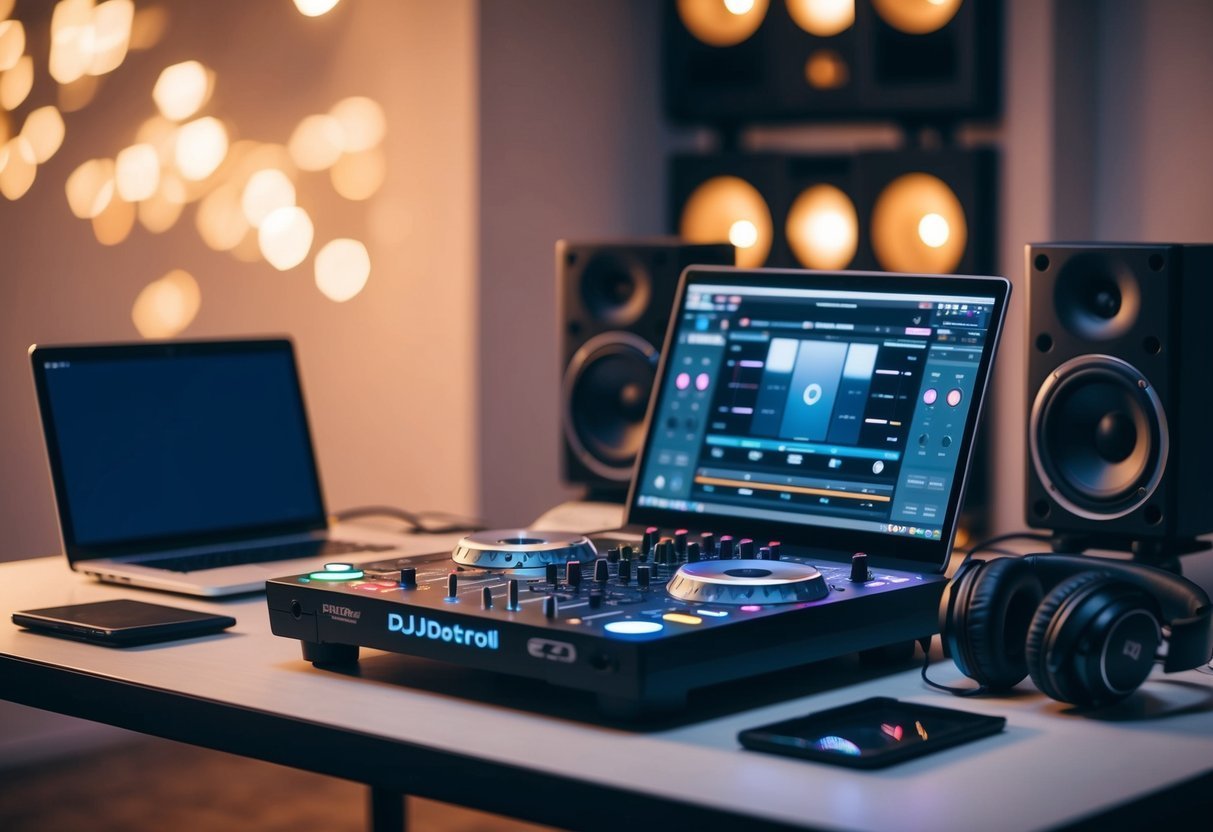Getting the right DJ controller can make all the difference if you’re diving into the world of music production.
These controllers aren’t just for live performances; they’re versatile tools that help you craft tracks with precision and flair.
By integrating seamlessly with software like Serato, Traktor, or Rekordbox, they expand your creative possibilities and provide hands-on control over your music.
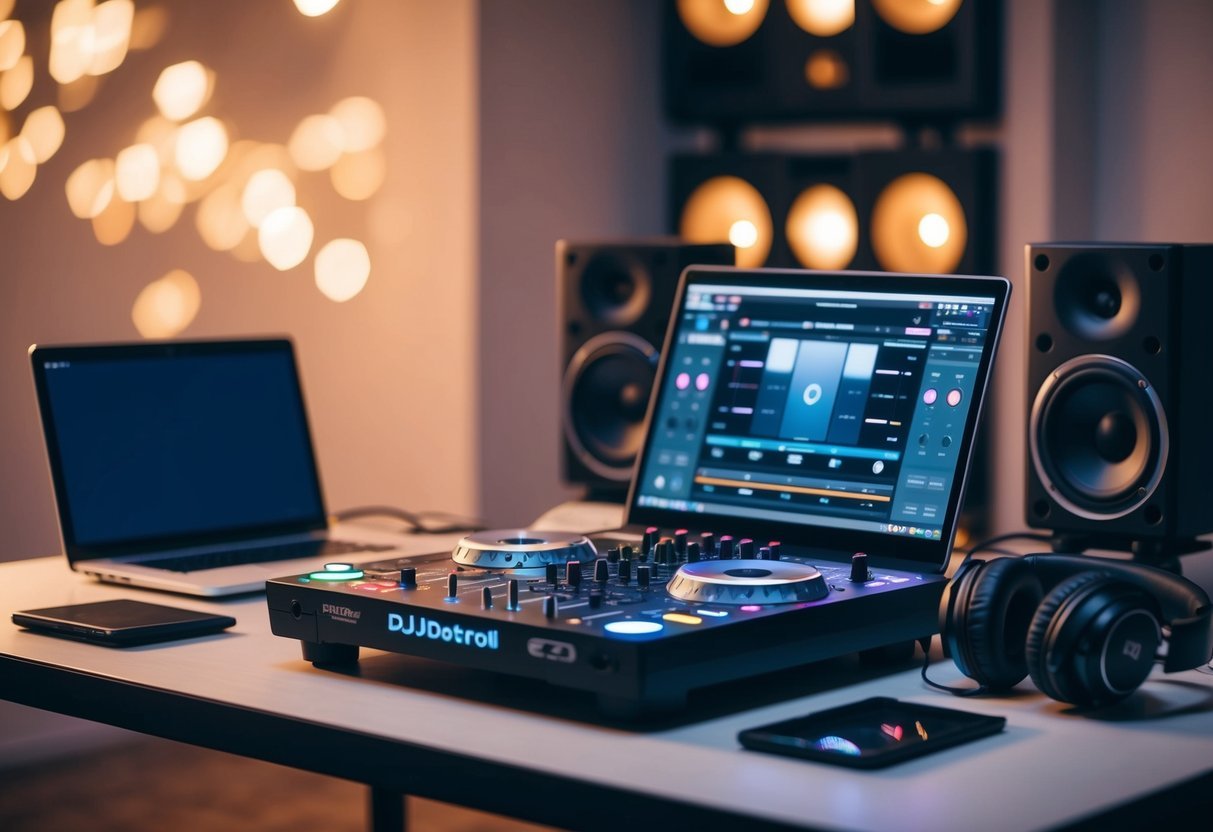
DJ controllers bridge the gap between your musical intent and the digital world, offering an intuitive interface that mirrors the feel of traditional vinyl setups. Whether you are a beginner or an experienced producer, choosing a controller that matches your style can significantly elevate your workflow and output.
Controllers such as the Pioneer DJ XDJ RX2 or the Numark DJ2GO2 Touch cater to different needs and budgets, offering features that suit both small-scale projects and professional environments.
Imagine transforming your bedroom into a creative music studio, where your ideas can come to life with every twist, turn, and touch on your new DJ controller.
The tactile feel and the ability to manipulate your sound in real-time keep you engaged and connected to the music you’re creating, offering a hands-on approach that traditional DAWs often lack.
Whether you’re juggling samples, triggering effects, or just crafting the perfect beat, the right DJ controller becomes an extension of your creativity.
Exploring DJ Controllers
When it comes to choosing DJ controllers for music production, there are several factors to weigh.
Understanding the various types available and the features that make a great controller are key factors in making the right choice.
Types of DJ Controllers
There are different types of DJ controllers to suit various needs and skill levels. All-in-one controllers are perfect for those who seek both simplicity and performance in one package, offering built-in screens and controls that handle everything.
For a more traditional setup, consider modular controllers.
They offer flexibility, allowing you to combine decks, mixers, and software to build a custom configuration that fits your style.
Performance controllers boast features like performance pads for triggering samples or loops.
They cater to DJs focused on live remixing and creativity.
Controllers with a touchscreen interface bring an intuitive experience, giving you direct control over your tracks and effects.
Lastly, those with motorized platters mimic the feel of vinyl, ideal if you enjoy scratching and beat juggling.
Key Features to Consider
Look for controllers with multifunction performance pads that enable triggering of samples and loops. Audio interfaces handle signal quality and connection efficiency, so prioritize models with high-quality audio output.
Having ample USB ports allows for connectivity with various gear such as MIDI controllers and additional storage devices.
Consider controllers with a built-in touchscreen to simplify navigation and focus more on your performance.
Don’t overlook the importance of software compatibility.
Some controllers are optimized for specific DJ software, which can significantly enhance your workflow.
Ultimately, choose a controller that matches not just your current needs but also leaves room for skill development.
Getting Started with DJ Software
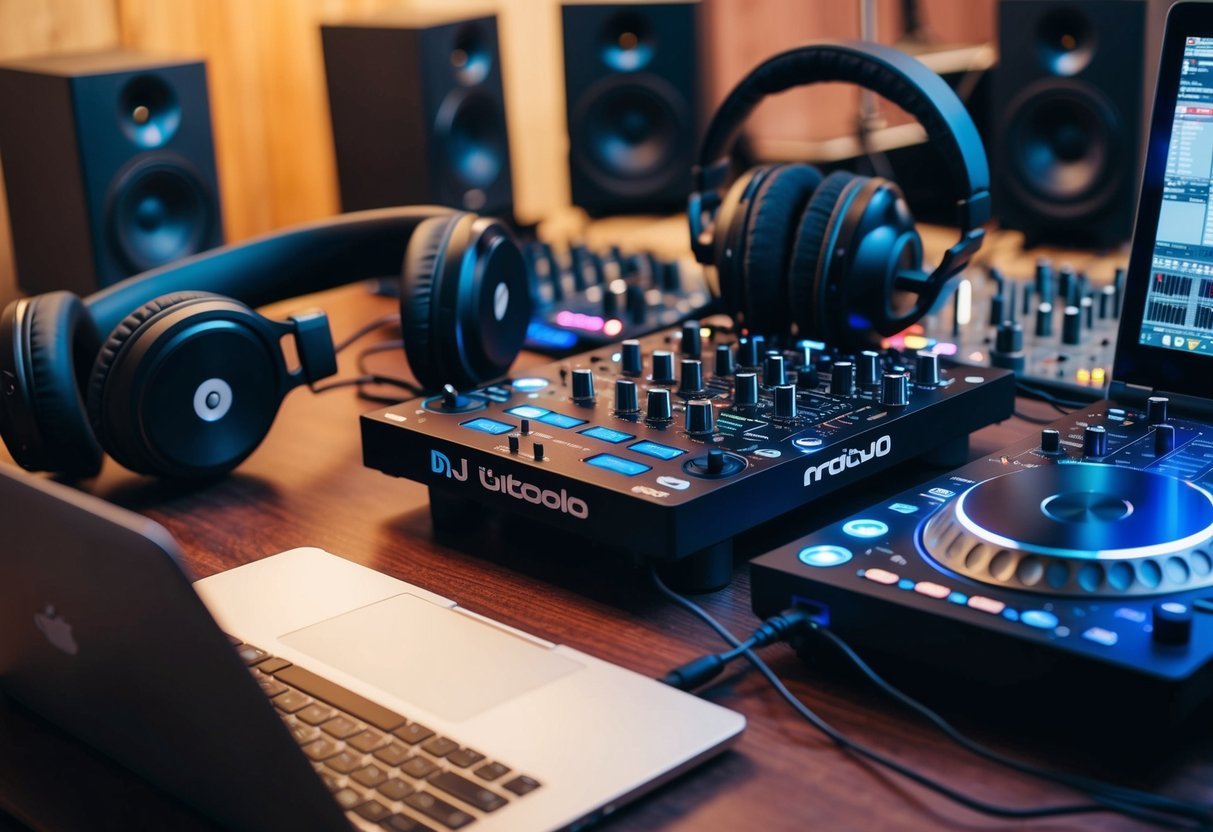
Diving into DJ software can open up a world of music mixing and production possibilities.
Selecting the right software and properly connecting your DJ controller are essential steps to get underway.
Overview of Popular DJ Software
When starting with DJ software, you’ll encounter a few popular options. Serato DJ is widely used, especially for scratch DJs and those who love remixing, with both a free Lite version and the paid Serato DJ Pro.
Rekordbox DJ is another strong contender, providing robust music management and performance features.
Algoriddim djay Pro is user-friendly and supports streaming directly from platforms like Tidal and SoundCloud.
Each software has its unique benefits, so it’s crucial to consider what best suits your needs and style.
Connecting Your Controller to DJ Software
Connecting your DJ controller to the software is essential for optimizing its features.
Start by ensuring that your device is compatible with the software you choose.
Most controllers work seamlessly with major DJ software, but double-check compatibility for models like the Pioneer DJ DDJ series or the Native Instruments Traktor Kontrol.
Once you have confirmed compatibility, download and install any necessary drivers or firmware updates from the manufacturer’s website.
After setup, you can configure your controller within the software to ensure a smooth transition between hardware and software control.
Adjust settings to match your performance needs, allowing you to focus on mixing and creating.
The Best DJ Controllers in the Market
If you’re delving into the world of DJ controllers, knowing what’s available can vastly improve your experience.
Whether you’re just starting out or looking for professional options, here are some of the top choices you might consider.
Top Picks for Beginners
For beginners, finding a DJ controller that’s intuitive and affordable is crucial.
The Numark Mixtrack series offers a great balance with its user-friendly layout and essential features.
It’s a hit among newcomers looking to get their feet wet without a heavy investment.
The Hercules DJ Control Inpulse T7 is another solid option, known for its tactile feel akin to vinyl.
It’s perfect for those who want to experiment with both digital and analog mixing techniques.
The built-in tutorials make it easier to grasp the basics.
Pioneer DDJ-400 can also be a good starter choice with its user-friendly design inspired by professional gear.
You’ll appreciate its compatibility with various DJ software, ensuring you have the flexibility to evolve as you learn.
High-End Choices for Professionals
For professionals, the Pioneer DJ DDJ-1000 stands out with its club-standard layout and high-quality jog wheels.
It’s geared toward those who need extensive functionality and robustness for live performances.
You’ll find its compatibility with Rekordbox particularly useful for seamless track management.
The Rane One offers the motorized platter experience, providing the authentic feel of turntables.
It’s renowned for its durability and precision, catering to scratch DJs who require responsiveness and reliability.
Meanwhile, the Denon Prime 4 takes performance to another level with its standalone capabilities and 10-inch touchscreen.
It supports multi-layer mixing, allowing you to focus on creativity without needing a laptop.
You’ll likely appreciate the professional-grade build perfect for demanding gig environments.
Integration with Music Streaming Services
Integrating DJ controllers with music streaming services can be a powerful way to expand your music library and keep your sets fresh.
Many controllers now support seamless connectivity to platforms like Beatport and TIDAL, offering real-time access to millions of tracks.
Using DJ Controllers with Streaming
When using DJ controllers with streaming services, the first step is setting up compatibility between your controller and preferred platform.
Popular services like Beatport, SoundCloud, and TIDAL have partnerships with leading controller brands.
For example, Serato DJ Pro allows you to stream music directly from TIDAL, letting you access curated playlists and personalized music selections.
With the help of dedicated integration guides, you can optimize the connection between your controller and these platforms.
Be sure to check for the latest software updates, as they often include improved features or expanded support for new services.
On some platforms, you can even analyze the waveform and BPM of tracks before adding them to your set.
This ensures you maintain the quality of your mixes and have all the necessary tools at your fingertips.
DJ Controllers for Scratch DJs
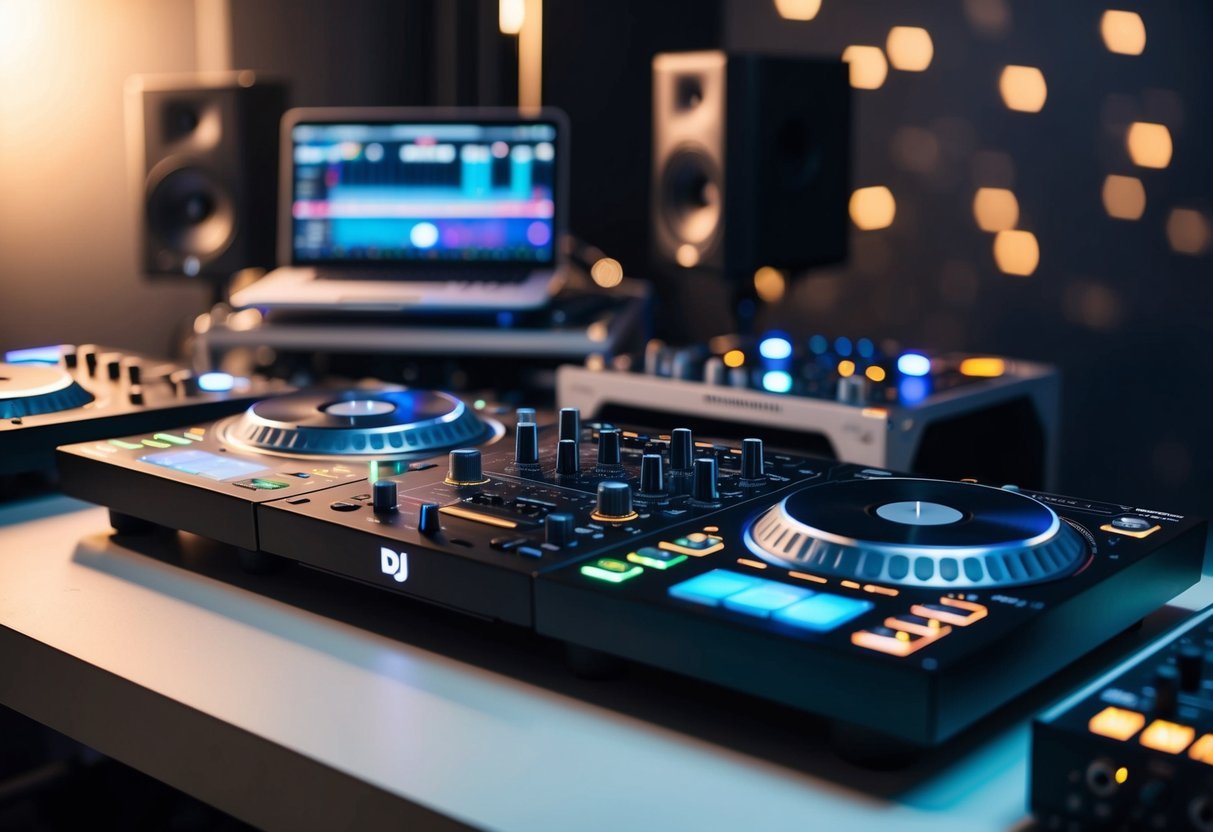
Scratch DJs need specific features in their controllers to perfect their craft.
Key aspects include precise jog wheels, responsive crossfaders, and sturdy build quality.
Here are the essentials to consider when choosing a DJ controller for scratch performances.
What to Look For in a Scratch DJ Controller
First, jog wheels are crucial.
Look for large, touch-sensitive jog wheels that offer excellent traction and immediate response.
It’s important they mimic the feel of vinyl as closely as possible, enabling smooth and controlled scratching.
Next, focus on the crossfader.
It should be durable and extremely responsive, allowing you to execute quick cuts and transformational effects effortlessly.
Adjustable tension and curve settings are also worth considering for added control.
Lastly, durability is essential.
Your controller should be built to withstand rigorous use.
Metal construction and quality components ensure that it can handle the demands of regular practice and performances.
Prioritize features over brand names to find the best fit for your needs.
Harnessing the Power of Standalone DJ Controllers
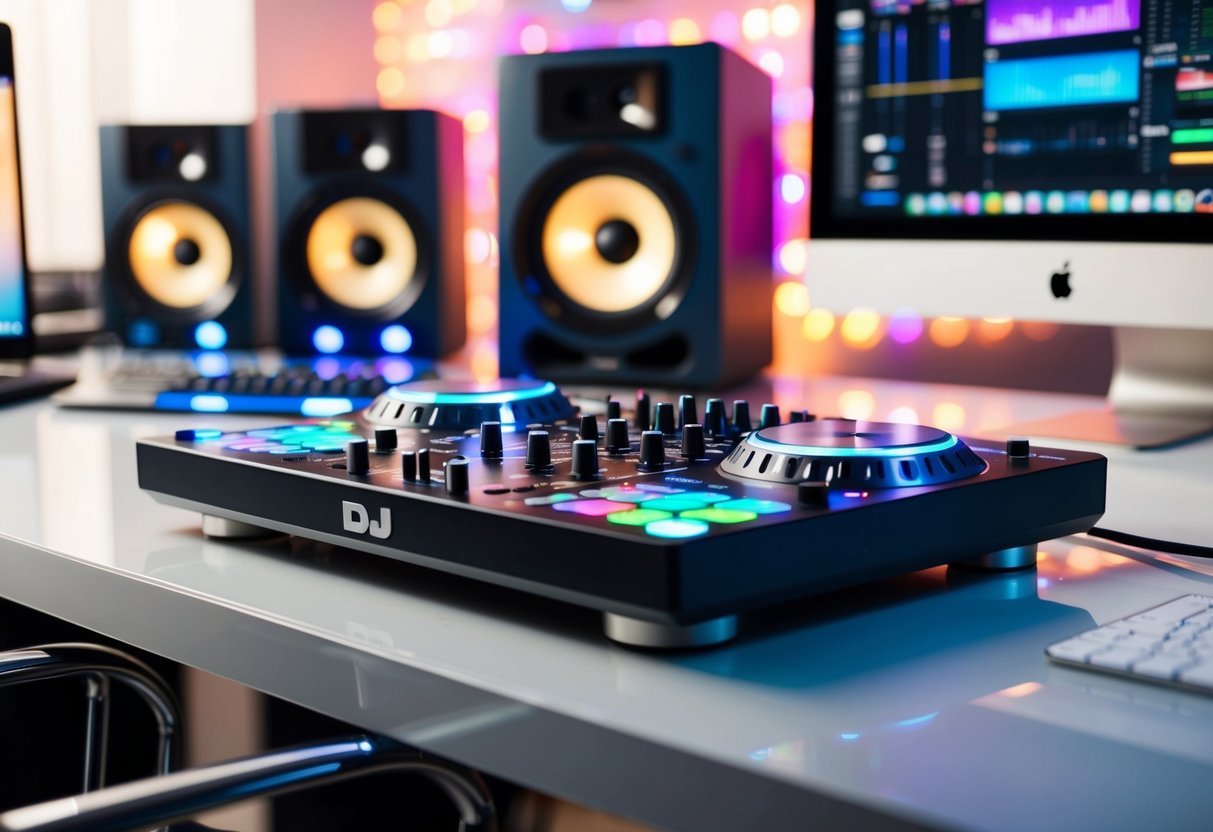
With advancements in DJ technology, standalone DJ controllers have become a versatile tool for music creators.
They offer numerous advantages, including integration with various audio systems and the elimination of a laptop.
Let’s examine these devices further, focusing on key benefits and some popular models.
Benefits of Standalone Systems
Standalone DJ controllers let you DJ without a laptop, providing a streamlined setup. Performance is improved due to reduced technical hassles.
You focus more on creativity than connectivity issues. Portability is another plus; these systems are compact, making them ideal for gigs.
They often include built-in audio interfaces and comprehensive input/output options.
This means flexibility in how you connect with sound systems, monitors, or other gear.
Such a setup is particularly beneficial in live settings, where reliability and ease of use are crucial.
It’s also important to note the cost-effectiveness of standalone systems.
By consolidating numerous features into one device, you’re essentially getting more for your investment.
This practical aspect appeals to hobbyists and professionals alike.
Popular Standalone Controllers
When choosing a standalone DJ controller, several models stand out.
The Pioneer DJ XDJ-RX3 is renowned for its user-friendly interface and robust features.
It is a favorite among DJs looking for compatibility with Rekordbox and excellent sound quality.
The Denon DJ Prime 4 Plus offers four-channel support and a large touchscreen, perfect for complex mixes.
If you’re leaning towards mobility, the Denon DJ Prime GO is a solid choice.
It’s battery-powered, allowing you to perform anywhere without sacrificing quality.
The Numark Mixstream Pro+ also deserves mention, especially for its affordability and impressive feature set.
These options provide a good starting point for any DJ aiming to elevate their craft with a standalone solution.
The Role of Connectivity and Ports
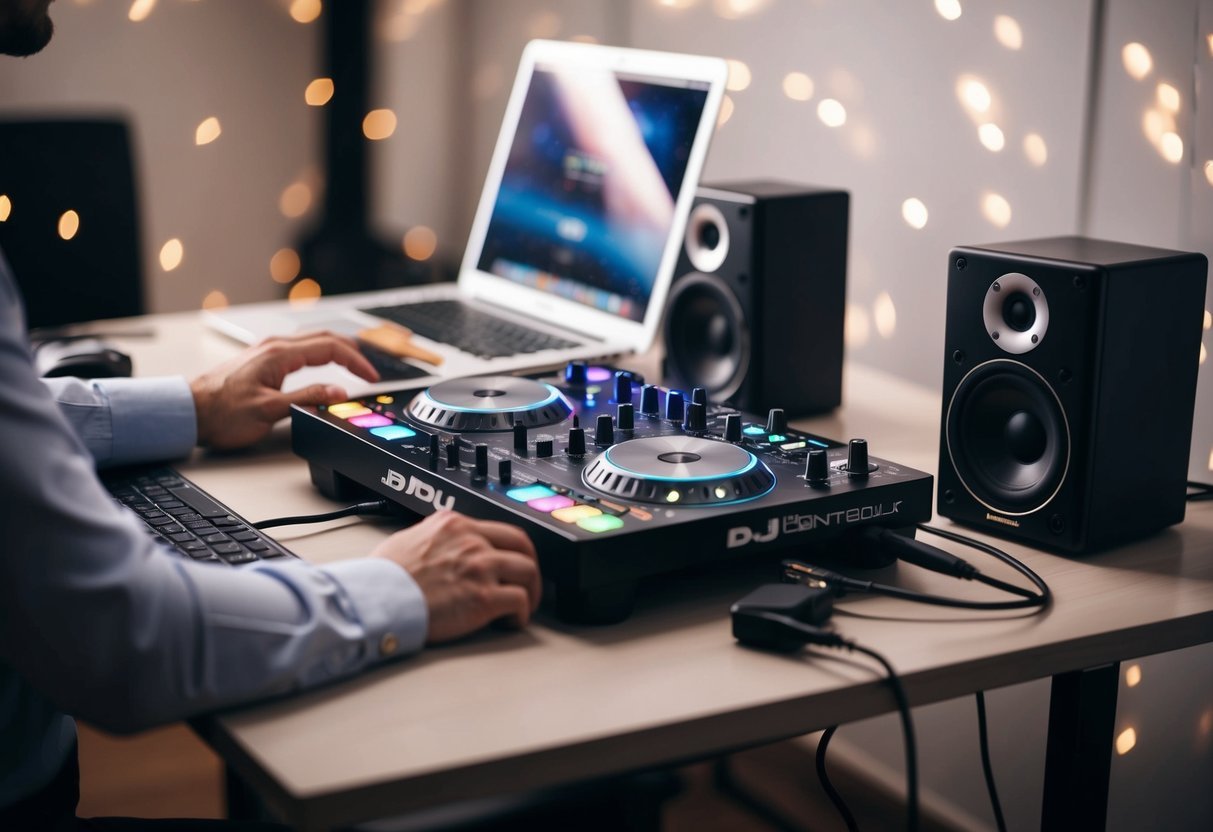
DJ controllers serve as the hub that connects your digital music library to your physical DJ setup.
Understanding how connectivity options like USB ports and microphone inputs affect your experience can greatly enhance your performance.
Understanding Input/Output Options
When choosing a DJ controller, ensure it has USB ports.
USB ports connect your controller to your laptop or music library.
They often provide power and allow for data transfer, making the whole operation seamless.
Newer models might feature USB-C for faster and more efficient connections.
Microphone inputs allow you to integrate vocal elements into your mix, either for announcements or live performances.
Some models include settings to fine-tune microphone inputs, affecting sound quality and effects.
Port variety can impact what additional equipment you can use.
Balanced XLR outputs, RCA connections, and headphone jacks contribute to a versatile setup.
Invalid connections might limit your creative possibilities, so it’s vital to consider what gear you’ll be integrating.
Enhancing Performance with Built-in Effects
DJ controllers offer various built-in effects that can elevate your musical performance.
These effects add distinct flavors to your tracks and create a dynamic listening experience.
Two key types of effects commonly used are Sound Color FX and Beat FX.
Sound Color FX
Sound Color FX lets you manipulate audio elements in intuitive ways.
Common options include filter, noise, crush, and space effects.
By adjusting knobs, you can add depth and dimension to your audio.
For instance, applying a filter can smoothly transition between bass and treble, giving you control over the music’s energy.
These effects enhance creativity, allowing you to add unique touches live.
Beat FX
Beat FX synchronizes effects with the music’s tempo, ensuring everything stays on beat.
This type enhances rhythm and movement by timing changes perfectly with the track.
Popular Beat FX includes delay, echo, reverb, and flanger.
When you use delay, for example, it adds an echo repetition.
This makes your sets more engaging by highlighting particular moments or creating dynamic shifts in energy and mood.
Mobile DJs and Compact Setups
When you’re always on the move as a mobile DJ, you need equipment that’s easy to transport and set up.
Compact DJ controllers offer the perfect balance of functionality and portability.
Selecting the Right Gear for Mobility
Choosing gear with mobility in mind is key for any mobile DJ.
You need lightweight controllers that still pack a punch in features.
The Numark Mixtrack Platinum FX is a solid option, offering a robust feature set but remaining easy to carry around.
Another great contender is the Roland DJ-707M.
It’s compact yet professional, designed to handle various gigs, from weddings to club nights.
Its durable build makes it reliable for frequent travel.
When you prioritize weight and size without sacrificing performance, you’re always ready for your next gig.
Advanced Features for DJ Controllers
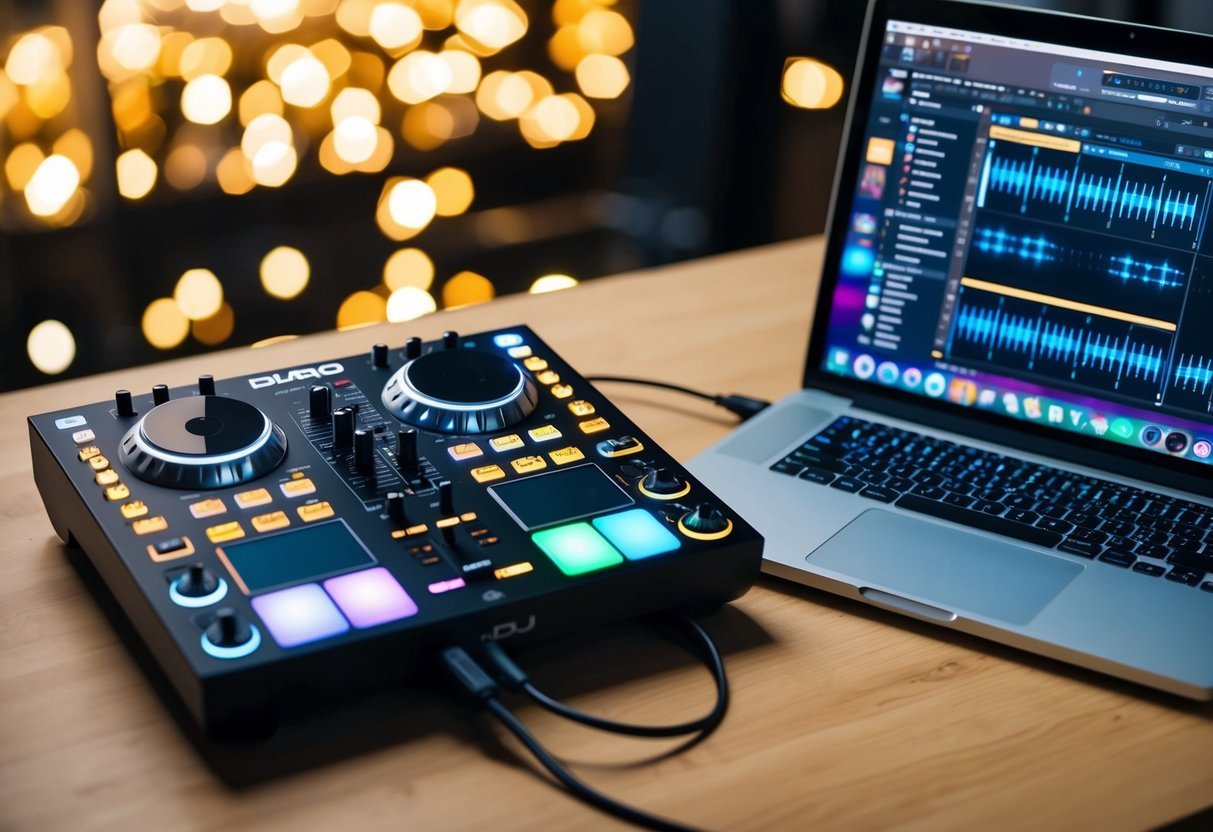
When you’re choosing a DJ controller, it’s essential to consider advanced features that can enhance your music production experience.
Elements like gesture control and lighting integration offer new levels of creativity and convenience.
These technologies add depth to your setup, providing interactive options that can elevate performances.
Gesture Control
Imagine controlling your music with a flick of your wrist.
Gesture control lets you do just that.
By using sensors, your movements can be translated into sound changes or effects.
This offers a hands-free way to interact with your tunes, leaving both hands free for more creative inputs.
Whether tweaking bass or adding reverb, you gain an intuitive interface that feels natural and innovative.
Gesture control is perfect for DJs looking to impress audiences by seamlessly transitioning between tracks and effects.
It’s a tech-forward approach that prioritizes fluidity and spontaneity.
Lighting Integration
Lighting integration means your controller can sync with lighting systems, creating a visually engaging performance.
Using specialized software or on-board features, you can manipulate lights to match rhythms and beats.
It’s a powerful way to add visual flair to your sets.
With lighting control, you can coordinate light shows that move in harmony with the music, drawing your audience deeper into the experience.
This feature often supports WiFi music streaming and other modern capabilities, allowing you to focus more on crafting immersive, cohesive performances that captivate the crowd.
Building a Complete DJ System
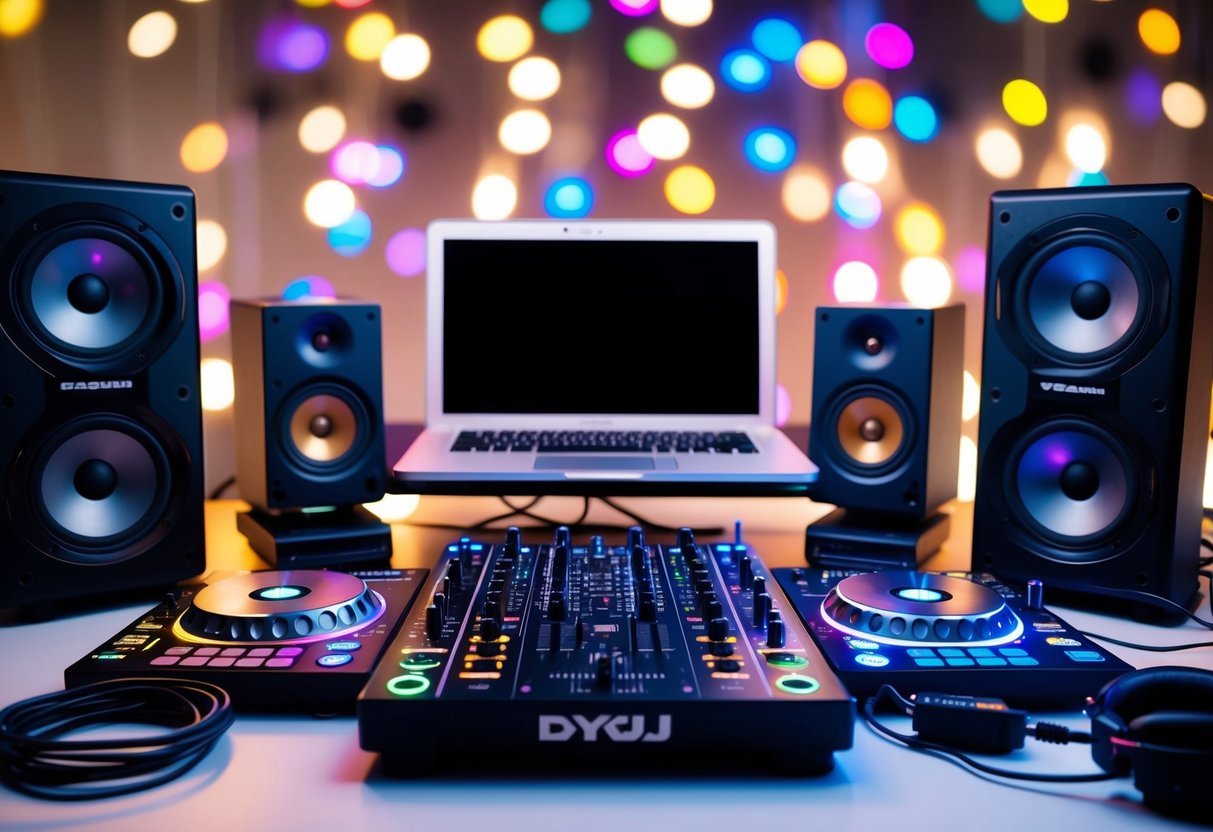
Crafting a DJ system involves selecting gear that matches your style and needs.
Start with a reliable mixer and players for seamless mixes, and incorporate essential gear for quality and creativity in your music production.
Mixer, Players, and Other Essential Gear
A mixer is central to any DJ setup, allowing you to blend tracks smoothly.
Consider a standalone mixer for flexibility, or a 4-channel DJ controller that combines mixer functions with deck controls.
When it comes to players, you can choose between traditional turntables or digital media players.
Turntables offer a classic vinyl feel, while digital media players allow you to manage and manipulate digital tracks.
Essential gear includes high-quality sound systems, headphones, and external effects units.
High-quality sound enhances performance, while headphones are crucial for cueing tracks.
These elements ensure your DJ system delivers professional results, allowing you to express your unique style effectively.
Frequently Asked Questions
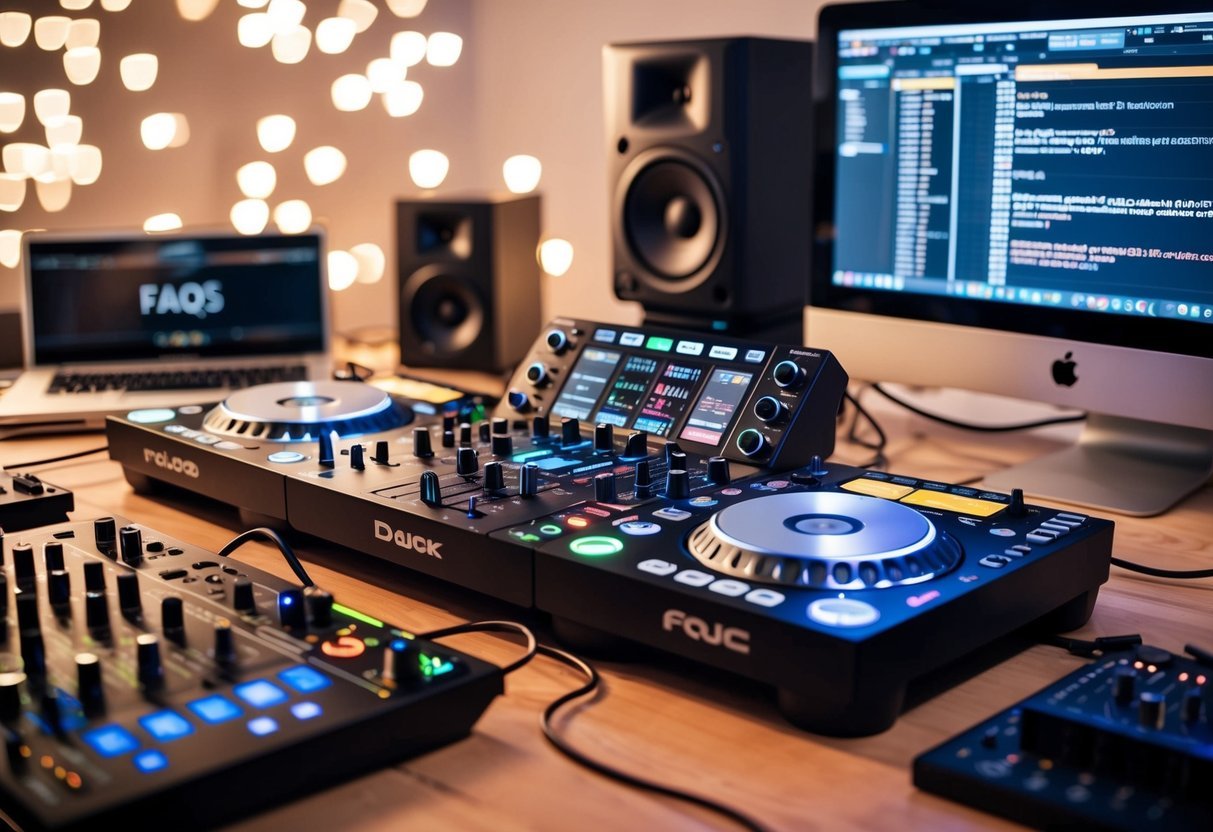
When exploring DJ controllers for music production, it’s essential to consider options for beginners, beat creation capabilities, and professional choices.
You’ll want to evaluate factors like key features and affordability in making your decision.
What are the best DJ controllers for beginners to start making music?
For those just starting, look into models like the Hercules DJ Control Inpulse T7.
It’s user-friendly, with features that mimic vinyl for a more traditional feel.
It’s an affordable way to get both digital and analog experiences.
Can a DJ controller be used to create your own beats?
Absolutely! Some DJ controllers, like the Roland DJ-505, even come with built-in drum machines that can help you create beats.
These devices often include step sequencers, making it possible to mix beats live during performances.
Which professional DJ controllers are preferred by top DJs?
Top DJs often go for high-end models from brands like Pioneer.
Controllers such as the Pioneer DDJ-1000 are popular due to their robust build, extensive feature sets, and compatibility with professional DJ software.
What are the key features to look for in a DJ controller for music production?
Focus on controllers that offer multiple channels, compatibility with popular software, and features like customizable pads, motorized platters, or built-in effects.
Having flexibility and high-quality sound output is essential.
How does a Hercules DJ controller stack up against Pioneer models?
Hercules controllers are generally more budget-friendly and cater to beginners.
While they offer a solid range of features, Pioneer models tend to provide more advanced capabilities suited for professional use.
Hercules is a great starting point, but Pioneer often wins in terms of depth and professional features.
Are there affordable DJ controllers that are suitable for music production?
Yes, plenty of cost-effective options are available.
For example, the Numark Mixtrack Pro FX is budget-friendly and packs in the features necessary for music production.
Look for controllers that offer good build quality and compatibility with your preferred software.

